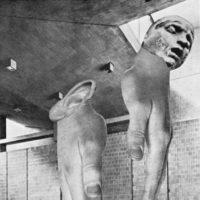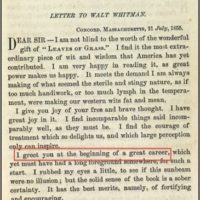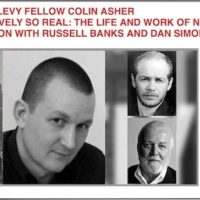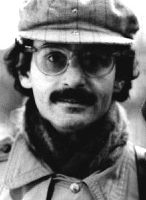The Something Else Factor: Alison Knowles, Barbara Moore, Martha Wilson and I will be participating this evening in a panel about the glory days of Something Else Press, moderated by Hannah B. Higgins, at the Emily Harvey Foundation. It’s the first of four discussions organized by Christian Xatrec and Alice Centamore. The events are free. RSVP to ehf.nework@gmail.com
Greek Poet Nanos Valaoritis Crucified by Time
Nanos Valaoritis has died. He was 98. Read one of his great poems: “Endless Crucifixion.”
Brion Gysin: ‘Dante in the Tasile’
Richard Aaron writes in an email: “Here is a work by Brion that I have in front of me. He did very many of these. Around 1958 the calligraphic element began to appear, but this is from 1951. I used to own a large bunch of his surrealist work from the 1930s. Typical of the period. He was fortunate to have been tossed out of the movement by Breton.”
‘YES! I Have Wanted This Book for Years …’
… but used copies have always been too expensive. Publishing event of the year for me.—zanntone, via Twitter | A new extended facsimile reprint from Moloko has just been published in hardcover, and it only costs about 25 bucks.
Remembering Margaret Mead
In my antideluvian days, when I was starting out as a reporter, I interviewed Margaret Mead. I didn’t know much about her beyond the usual, so my interview hardly went beyond the usual. What I remember most was the photo I took of her and how smitten I was by her graciousness.
The Beast Is Back
The editors of the London Review of Books say their first edition of The Beast of Brexit, the late Heathcote Williams’s takedown of Boris Johnson, sold out “in a matter of weeks” just before the Brexit referendum in 2016. After it went through several reprints, the book was published in a second edition “with a […]
Alison Knowles: ‘Proposition #2 for Emmett Williams’
A transcript of this piece was published under the title “A house of dust, computer poem” in FANTASTIC ARCHITECTURE edited by Wolf Vostell and Dick Higgins (Something Else Press, 1969). The reading, on a cassette recording made ca. 1967, was salvaged from a recent basement flood at S|U’s Manhattan perch. It features four readers, including Alison Knowles and Dick Higgins. Any help identifying the two other voices would be appreciated.
What Happened to Nelson Algren?
Nearly three months after Colin Asher’s biography of Nelson Algren was published, and just in time for readers to take a break from serious books as they head off on vacation to escape the summer heat, our dearly beloved newspaper of record has deigned to take notice of Never a Lovely So Real. But let’s put that aside because Susan Jacoby’s review, which will appear Sunday in the print edition of The New York Times Book Review, is not only honest, clear, and well reported, it sets a judicious standard. Which gives it credibility.
Strictly Unpaid Advertising
Your humble blogger has published a new collection of poems. Moloko will bring it out in a bilingual English-German edition in Germany. In the meantime, however, an American edition is now available without the translations but with a complement of images. ‘All That Would Ever After Not Be Said’ is composed of forty-two deformed sonnets of mine and forty-two collages by the late Norman O. Mustill.
From Mayor to Nightmare
‘The Dark Side of Boris Johnson’: Now that he is on his way to becoming the new Prime Minister of the U.K., the staff believes this blogpost of Aug. 24, 2016 is worth reposting: Back in April, before the Brexit vote [on June 23, 2016], Heathcote Williams wrote a merciless pamphlet, subtitled “A Study in Depravity,” about the most notorious cheerleader for the British exit from the European Union.
A Dialogue: ‘All That Would Ever After Not Be Said’
Norman Ogue Mustill (1931-2013), longtime friend and collaborator, was a little-known master collagist. His collage is from ‘Flypaper,’ originally published by Beach Books, Texts and Documents, and is not intended to illustrate the deformed sonnet facing it (which owes a debt to Evelyn Waugh). Nor is the sonnet meant as commentary on the collage. The juxtaposition was determined by chance. The dialogue between them simply honors a friendship.
From Emerson to Whitman to Ferlinghetti to Ginsberg
This teaser appeared today at Arts & Letters Daily in its “New Books” column: “‘I greet you at the beginning of a great career,’ Lawrence Ferlinghetti wrote Allen Ginsberg. … Thus began the effort to publish Howl, a landmark case of attempted censorship…” The teaser linked to an article that appeared recently in Spiked apropos the publication in the U.K. of The People v. Ferlinghetti: The Fight to Publish Allen Ginsberg’s Howl, which, it so happens, is closely related to I Greet You at the Beginning of a Great Career: The Selected Correspondence of Lawrence Ferlinghetti and Allen Ginsberg, 1955-1997, published four years ago here in the U.S. Why do I mention all of this?
‘Trans-Am Totem’ and ‘Autogeddon’
A friend sent this photo of Marcus Bowcott’s “Trans Am Totem,” which stands amid the traffic in Vancouver. As you see, five cars are stacked (four of them crushed) on top of a base made from a single tree trunk. What you cannot see is that the Cedar trunk is signed by a Native First Nations Carver who carved a Bear Paw & Claws symbol into the foot of the trunk.
Brooklyn Book Launch: ‘Never A Lovely So Real’
Nelson Algren is always associated with Chicago, where he grew up and where many of his books are set, including Never Come Morning and The Man With the Golden Arm, as well as The Neon Wilderness and Chicago: City On the Make. But the official launch of Colin Asher’s Never A Lovely So Real: The Life and Work of Nelson Algren will take place in Brooklyn at the Community Bookstore, not far from where Asher lives. Does everything happen these days in Brooklyn? Next week he will discuss the biography at the CUNY Graduate Center in Manhattan, where everything used to happen.
William Levy, R.I.P.
William Levy, sometimes called “the Talmudic Wizard of Amsterdam,” has died at the age of 80. A prolific expatriate American writer and editor, he left the United States in 1966 and earned a reputation as one of the leading intellectual and sexual subversives in Europe. Levy was a master of literary outrageousness, an editor of The Insect Trust Gazette, International Times, publisher and editor of Suck magazine, and producer of the Wet Dreams Film Festival, as well as a poet and radio broadcaster.
Nelson Algren’s Strange Midnight Dignity
In straightforward yet graceful prose and with deep insight—let alone an immense amount of meticulous research—Colin Asher has produced a major literary biography. “Never A Lovely So Real’ testifies to the richness of Algren’s genius as a writer and explains the misunderstood nature of the man. It reveals what made him tick, exposes the legends, and brings him to life in a way no previous biography has. It certainly changed my perception of him. And if there’s any justice, it will put Algren’s books back into the heart of the 20th-century American canon.
‘Flesh Film’: A Book as Artist’s Fever Dream
When a book reads like an hallucination and looks as magnificent as Flesh Film, it’s an artist’s book as much as a writer’s. The designer Robert Schalinski has given the author’s text the appearance of a manuscript duplicated on an old copying machine and punctuated it with the author’s visual collages. It’s gorgeous stuff, published in English by the German publisher Moloko Print, and it’s available for the first time in the U.S. from printedmatter.org.


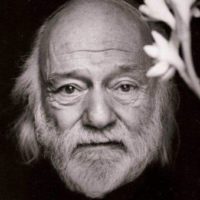

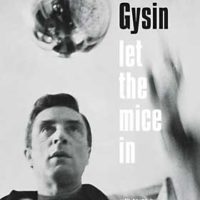
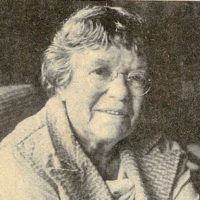
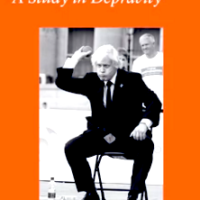

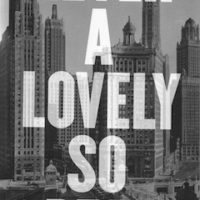
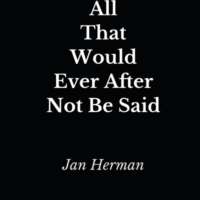
!['Brexit Boris: From Mayor to Nightmare' by Heathcote Williams [Public Reading Rooms, 2016]](https://www.artsjournal.com/herman/wp/wp-content/uploads/2016/08/Brexit-Boris-cover351-200x200.jpg)
